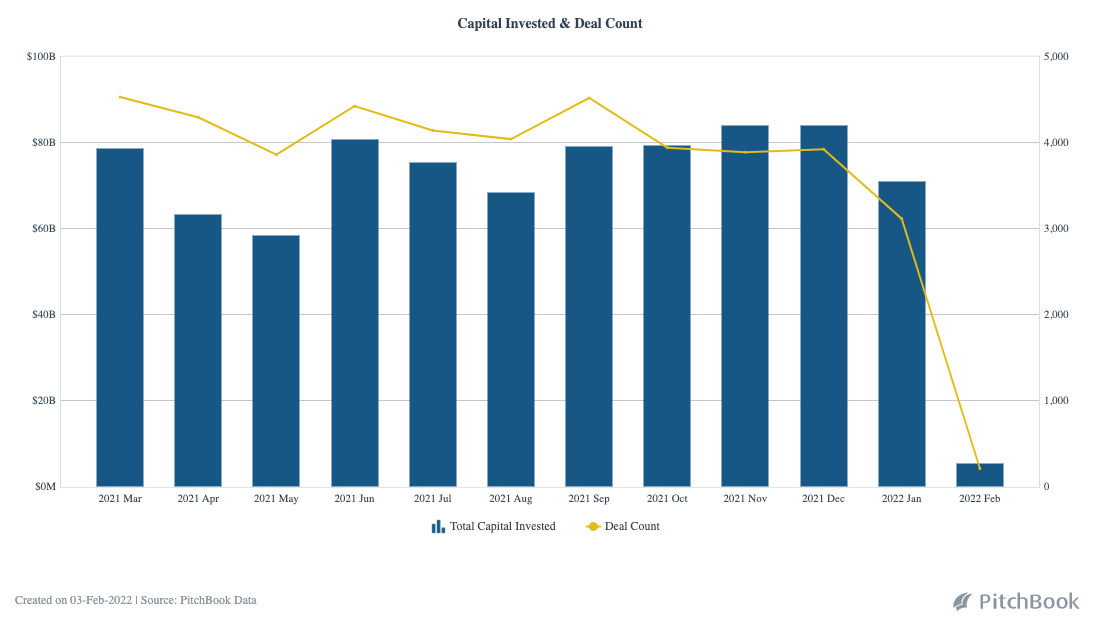The pandemic trade ended a little while ago. The COVID-induced boom that powered a host of tech companies is also fading quickly. The results are showing up in Big Tech earnings. For startups, it’s bad news — the good times of the last few years appear to be in rapid decline, with many startups holding onto speculative valuations and revenues more nascent than impressive.
The question before us is simple: Can the investing dynamics of the venture capital market slow to the point that startup valuations (expectations, essentially) reach parity with potential exit valuations (forecasts, essentially) before too many young tech companies are priced like early- to mid-2021 exits are still possible?
The Exchange explores startups, markets and money.
Read it every morning on TechCrunch+ or get The Exchange newsletter every Saturday.
The warning signs are piling up, and we’re not just talking about a changing monetary environment, though that does matter. We’re seeing tech companies on the public markets struggle to meet investor expectations for future growth in any number of categories.
 Social media? Struggling. Fintech? Struggling. Content streaming? Struggling. Trading? Struggling. Key industries that spawned a host of high-priced startups are staring down a market in which their public comps are taking on water faster than bulls can bail.
Social media? Struggling. Fintech? Struggling. Content streaming? Struggling. Trading? Struggling. Key industries that spawned a host of high-priced startups are staring down a market in which their public comps are taking on water faster than bulls can bail.
And the damage could get even worse. After all, we’ve not even begun the monetary tightening expected in the rest of the year. This is just the beginning.
Pain
Facebook shares are off around 25% this morning, cutting around $200 billion from its market cap. The Nasdaq Composite is off 1.8% as a whole. Cloud stocks are off 1.6%. Snap’s stock is off 19%. After falling from around $175 per share to around $130 yesterday, PayPal is off another 4% this morning. Spotify stock is off 17%. Fintech stocks, depending on your index of choice, are off more than 2%.
All this after we saw the selloff from December through the new year in the value of software companies. It’s a changed landscape.
Why? Investors had valued a host of companies like their pandemic bump was more akin to their new reality. However, it turns out that a lot of pandemic growth wasn’t free — it came at the expense of later growth. In dork terms, revenue and user growth were not generated amid COVID-19, but pulled forward. This led to great near-term results, but slower growth in the medium term as companies had already eaten their second and third courses during the pre-dinner drinks portion of the evening meal.
A few examples will help:
- TechCrunch wrote in January 2021 that “Netflix shares soar as it passes 200M paying subscribers.” Then, one year later, Netflix reported earnings and its slowest user growth since 2015.
- PayPal had a simply sizzling 2020, with the company reporting “record-setting payment volume and new account additions bolstering its scale,” as ZDnet noted in early 2021 when the company reported its Q4 numbers. Lately? Falling user growth helped bring PayPal’s value down by a simply huge amount this week.
- Facebook is another company seeing demand fall. Its user numbers dropped for the first time that we can recall in its latest earnings report. And the company’s pivot to “metaverse” is thus far producing huge losses and revenue gains too small to move the needle. Ouch. In the year-ago quarter, Facebook beat on revenue, earnings per share, daily active users and monthly active users.
The times have changed.
Fear?
Yeah, but.
The Exchange ran a preliminary scan of PitchBook this morning, and the data is not precisely showing a slowdown in private capital investment. Here’s the chart that includes global venture capital investment and growth deals including private equity on a monthly basis:

Image Credits: PitchBook
Recall that venture capital data is laggy, so the January bar in the above chart will likely fill in a little bit more in the coming weeks. Which means that, thus far in 2022, we’re seeing private-market investment nearly precisely on par with Q4 2021, which was a simply insane quarter. Even more, venture capital dollar volume in 2022 is sticking to its 2021 cadence more generally, which means that, well, times are not changing for startups at the same pace that we’re seeing them molt for public tech companies.
Dissonance!
I won’t lie, I hate seeing the stock market eat its own hat. Why? Because it makes my index funds cry. But the pain of falling tech valuations is going to bite startups even harder in the backside if they don’t realize that the ground is shifting underneath their feet. Venture capitalists, too.
